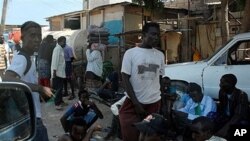The U.N. refugee agency reports a record number of people from the Horn of Africa have made the perilous journey across the Gulf of Aden to Yemen this year. The UNHCR says tens of thousands of Somalis and Ethiopians, driven by desperation, traveled across the sea in rickety smugglers boats.
The U.N. refugee agency says more than 74,000 Africans risked their lives this year to escape desperate situations of civil war, political instability, poverty, famine and drought in the Horn of Africa.
UNHCR Spokesman, Andrej Mahecic, says this figure represents a staggering 50 percent increase over the number of people who arrived in Yemen in 2008.
"Refugees and migrants make the dangerous journey on smugglers' boats across the Gulf of Aden and the Red Sea under harrowing conditions. In some cases, they are beaten, raped, killed or just thrown overboard into the shark-infested waters," he said. "In addition, the overloaded and overcrowded rickety boats sometimes capsize, resulting in the drowning of many aboard. According to the latest UNHCR statistics, 309 people drowned or did not survive the trip this year alone. In 2008, some 590 people drowned."
The mixed migration route through the Gulf of Aden and the Red Sea is considered to be the busiest and the deadliest in the world.
The U.N. refugee agency says Somalis are no longer the majority of arrivals, unlike in previous years. It says 32,000 Somalis arrived in Yemen this year, whereas 42,000 Ethiopians reached the Yemeni shores. This is more than double last year's number.
Mahecic says virtually all the Somalis who make it to Yemen go to one of two strategically located reception centers where they receive protection and assistance. But, he adds, relatively few Ethiopians go there. Most head for the Persian Gulf states in search of jobs.
He notes all Somali nationals are automatically recognized as refugees by the Yemeni authorities. He says Yemen currently hosts some 150,000 Somali refugees.
"Other nationalities, including Ethiopians, wishing to apply for asylum are required to undergo the refugee status determination procedure conducted by UNHCR. Over the past year, the vast majority of Ethiopians did not approach the reception centers, as they had no intent to seek asylum," he said. "However, we believe that some of them may have avoided approaching the centers, fearing arrest and detention as those who do not apply for asylum and are found to be I the country illegally could end up in Yemeni detention and are ultimately deported."
Mahecic says the UNHCR has had only sporadic access to the Ethiopians detained for illegal entry in Yemen. He says the agency has repeatedly relayed its concerns to the authorities over the continued detention and deportation of Ethiopians.
He says the authorities have somewhat eased up on this position. Since early this month, he says the UNHCR has been allowed to interview Ethiopians in two detention centers and more such visits are planned.
News
Record Number of People from Horn of Africa Flee to Yemen
update

UNHCR says tens of thousands of Somalis and Ethiopians, driven by desperation, traveled across the sea in rickety smugglers boats.



